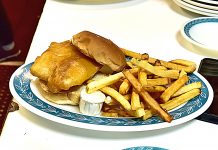
Until the 1980s, home economics was the class where students learned how to baste a turkey, lattice a pie, and chop an onion without crying. But today, it hardly appears on school curriculums. “We use food as a tool to connect to a lot of issues, and young folks have a pretty deep interest in it,” says Jen Rusciano, co-founder and executive director of Detroit Food Academy, a nonprofit organization that works with local educators, chefs, and business owners to inspire young Detroiters to effect change through food. Through their work, Rusciano and other culinary entrepreneurs suggest a Renaissance of home-ec is underway in Detroit.
In operation since 2011, Detroit Food Academy now has an after-school program in 12 high schools and two community centers across the city. The Academy teaches students how to balance their diets, understand food policy, and cook healthy meals. Throughout the year, they also meet with experts in nutrition, medicine, and physical fitness fields, ultimately channeling their knowledge into an annual capstone project. “Last year, our students at Denby High School turned their cafeteria into a nacho bar for the day,” Rusciano says. By operating a simulated food business — perfecting recipes, budgeting, packaging products — students also gain valuable entrepreneurial experience. In some cases, student recipes were featured on their corresponding school’s cafeteria menu.

Vegan blogger, Quiana Broden, is on a similar mission. The 40-year-old, who works full-time as a senior account executive at United Shore, adopted a vegan diet in 2008 after she was diagnosed with sarcoidosis, a growth of inflammatory cells that collect in various parts of the body. Broden began publishing her recipes on a blog titled, Cooking With Que. “I didn’t want to give my mac and cheese recipe up though,” she laughs. “I had claws on it.” In February 2017, she finally posted a how-to for her “cheezy” dish and her online presence exploded. “The next day, the vegan festival, Veg Michigan, asked me to do a segment for them, and eventually I was on Fox Detroit. Now, the dairy-free cheese brand, Daiya, is my sponsor.”Broden is in the process of building The Kitchen, a self-decribed “cool spot” where she plans to host a wide range of cooking classes and nutritional workshops for children and adults. She’s partnered with 12 Detroit public schools for the 2018-2019 school year and will host students from various grades in the New Center space for day-long field trips. Broden is also in talks with nutritionists from local hospitals, who she hopes to bring on staff later in the year. “The biggest thing I want to tell people is eat to live. Keep your diet 70 percent fruits and vegetables and 30 percent everything else.”

For those with a sweet tooth, pastry chef April Anderson of the west side bakery Good Cakes and Bakes, is also stepping into an educational role with the November opening of her second location. In this space, Anderson will launch the Food Education hub, a six-week class, scheduled to begin in January. Elementary to high school students living in nearby Palmer Woods will meet twice a week to learn how to bake from scratch and sell their goods. “It’s a boot camp for youth,” she says. “They’ll learn to bake, but also how to price out ingredients and source them locally. At the end of the class, they’ll have a bake sale where they’ll be able to sell the items they’ve made.”
Students will be in good hands. In June, Anderson was one of 15 culinary professionals chosen to participate in the James Beard Foundation’s Chef’s Boot-Camp for Policy and Change — another line to add to her lengthy list of accomplishments, which includes baking for celebrities like Oprah Winfrey and appearing on panels with notables like former President Bill Clinton. Given Anderson’s extensive confectionary skills, her students will sit in on classes ranging from how to make cinnamon rolls to how to turn a regular recipe vegan.
“We don’t have home economics classes anymore,” Broden says, adding that she loved the practical course as a child. “That’s what we’re trying to reteach here and now.”
|
|
|









